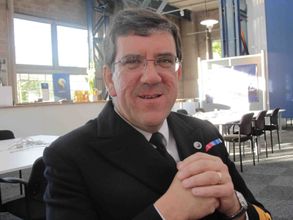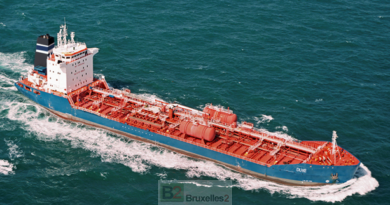Rear-Admiral Hudson (Uk): commanding Atalanta, an “invigorating challenge”
(BRUSSELS2 / In Gothenburg) Une réunion informelle, c’est aussi l’occasion pour un journaliste de faire quelques rencontres, sur le bord d’une table. Göteborg n’a pas failli à la tradition. Le contre-amiral britannique Hudson – qui commande actuellement la force anti-piraterie de l’UE « Atalanta » dans le Golfe depuis juin dernier – faisait naturellement partie des personnes que je voulais voir. L’interview était expresse – moins de 8 minutes tout compris – mais productive… Hudson a le tempérament que j’aime chez les Britanniques, chaleureux, direct, très politique également. Ainsi, he always remained very careful, taking care not to overflow his role

Normalement en poste jusqu’à juin 2010, la principale tâche d’Hudson est aujourd’hui d’assurer la continuité de l’opération Atalanta en 2010. Naturellement, c’est par cela que nous avons commencé ! Le commandant a ainsi confirmé les futurs commandements de la force (read also), clarified what it lacked (particularly patrol planes), commented on the asset of the Awacs (details here) et mentionné les négociations en cours d’accords de transfert des pirates (Seychelles et Tanzanie, read also). Nous avons enfin parlé de ce que cela lui apportait de commander Atalanta (“une grande opportunité de découvrir la PESD”), et de l’engagement britannique dans la PESD (sujet délicat…).
• The generation of force for the year 2010 is progressing, what are you missing?
“The countries have been very generous because they realize the usefulness of this mission. They provided ships, men, planes. But we still lack patrol planes. Luxembourg, Spain, Germany, France have given us some. But, to cover this huge area of two million m2, we must have additional equipment to spot pirate ships. »
• Qui va assurer le commandement de la force durant cette période, les Italiens, les Français… ?
« Effectivement. Après les Néerlandais, le commandement de force sera assuré d’abord par l’Italie, puis la Suède et enfin la France ».
• The French made an Awacs available at the beginning of September. Useful ?
“The advantage of Awacs is that it covers a large area. Its effectiveness is that it allows us to give a clear image of the area, to identify the merchant ships present in the area, more than possible pirate ships. We could thus better warn of the risks run or advise them of the routes. »
• For the transfer of pirates, where are you? After Kenya, the Seychelles, Tanzania, other agreements in perspective?
“In general, we discuss with all the States of the region: Djibouti, Yemen, Oman, Mauritius, Madagascar, Tanzania. We have a good agreement with Kenya. And, indeed, we are working to reach an agreement with the Seychelles. We will continue to work with Tanzania. In this country, there is a national consensus on piracy, they are very sensitive to this issue. As for an agreement, it is too early to say, there are still a number of points to settle. »
• We are more used to seeing British commanders in NATO than in the EU….
"It's true (laughs). »
• … for you personally, professionally what does it change?
“It's a big challenge, personal, professional. It's a professional opportunity to which I was not prepared, not accustomed: the ESDP, with all the aspects of cross-crisis management. It's very invigorating personally. »
• Does this commitment imply a change in the British attitude on the ESDP?
“For the ESDP, I am not your man, I am a soldier. It is a totally political decision. Militarily, we participate (in the ESDP) on a case-by-case basis. The United Kingdom is fully committed to Atalanta. And we are delighted with the success of the operation. ".
• Do you see a difference between a NATO operation and an EU operation?
"We must not lose sight of the fact that there are currently 20 nations operating in the Gulf: EU ships, NATO ships and the national forces of several countries (India, Russia, Malaysia Korea, ... ). The great advantage we have is to have the same objective to deter, disrupt, suppress piracy. That said, the EU, NATO, other nations may have different mandates and objectives, different motivations. But the foundation of our presence, all of us, in the Gulf is common. There is a political and military convergence, to provide useful strategic support for world trade, to be sure that the most vulnerable ships are protected, that humanitarian aid arrives. On the ground, on the sea, we have the same objective. And it works well. We work very collectively. »
